The Clarkdale Review: Intel's Core i5 661, i3 540 & i3 530
by Anand Lal Shimpi on January 4, 2010 12:00 AM EST- Posted in
- CPUs
Adobe Photoshop CS4 Performance
To measure performance under Photoshop CS4 we turn to the Retouch Artists’ Speed Test. The test does basic photo editing; there are a couple of color space conversions, many layer creations, color curve adjustment, image and canvas size adjustment, unsharp mask, and finally a gaussian blur performed on the entire image.
The whole process is timed and thanks to the use of Intel's X25-M SSD as our test bed hard drive, performance is far more predictable than back when we used to test on mechanical disks.
Time is reported in seconds and the lower numbers mean better performance. The test is multithreaded and can hit all four cores in a quad-core machine.
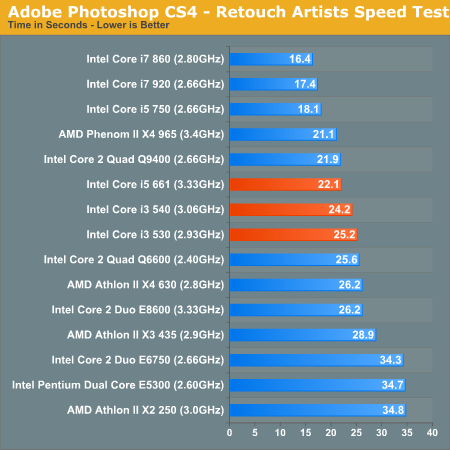
And this is where everything changes. While our Photoshop test won't keep four cores busy 100% of the time, it's enough to give the quad-core CPUs an advantage. Here the Core i5 661 is around the speed of a Q9400 but nowhere near the similarly priced Lynnfield Core i5 750.
The Core i3 540/530 are valuable as they are both able to outperform AMD's similarly priced Athlon II X4 630. The 661 doesn't make sense here but for the price, the i3 530/540 look promising.
DivX 8.5.3 with Xmpeg 5.0.3
Our DivX test is the same DivX / XMpeg 5.03 test we've run for the past few years now, the 1080p source file is encoded using the unconstrained DivX profile, quality/performance is set balanced at 5 and enhanced multithreading is enabled:
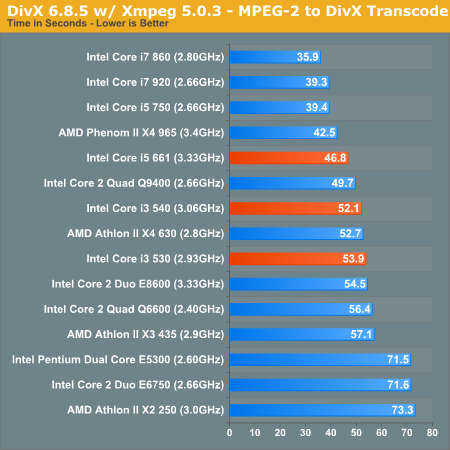
Video encoding is where you need more cores, and this is where the Core i5 661 really loses out in terms of value. It's the same price as a Core i5 750 but it's clearly slower. Turbo isn't saving the 661.
The Core i3 540 and 530 however look competitive. They're able to perform at around the same level as AMD's Athlon II X4 630, while drawing much less power.
x264 HD Video Encoding Performance
Graysky's x264 HD test uses the publicly available x264 encoder to encode a 4Mbps 720p MPEG-2 source. The focus here is on quality rather than speed, thus the benchmark uses a 2-pass encode and reports the average frame rate in each pass.
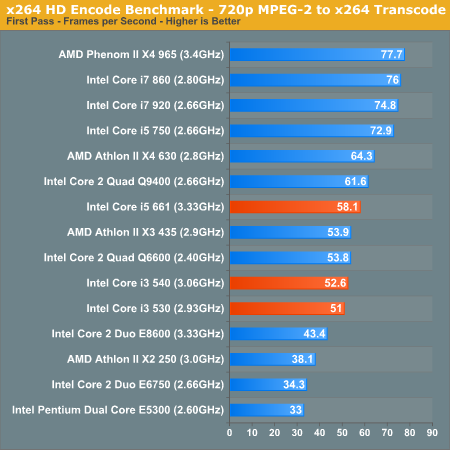
Competitive in DivX encoding, yes. But in our x264 encoding test, these Clarkdales just don't make sense. If you do a lot of x264 video encoding you're going to want Lynnfield or a quad-core Athlon II/Phenom II.
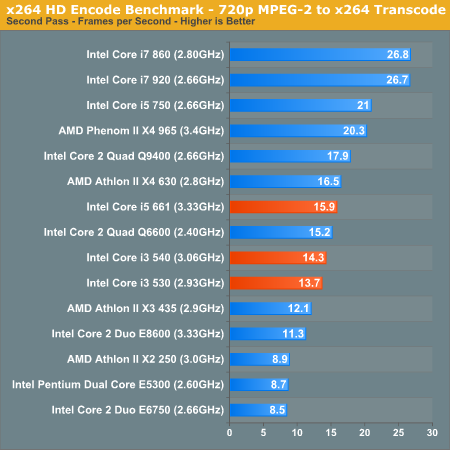
Windows Media Encoder 9 x64 Advanced Profile
In order to be codec agnostic we've got a Windows Media Encoder benchmark looking at the same sort of thing we've been doing in the DivX and x264 tests, but using WME instead.
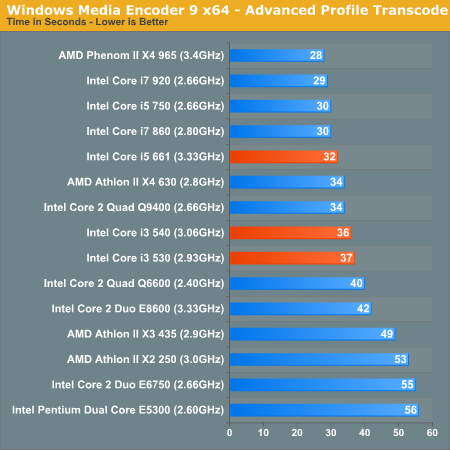
Rounding out our video encoding tests Windows Media Encoder 9 doesn't really show us anything different. The Core i5 661 is slower than it should be given its price, and here even the i3s lose out. If you do a lot of encoding, you want four cores. Simple as that.










93 Comments
View All Comments
rainman1986 - Monday, January 4, 2010 - link
I'm puzzled by the results for this cpu, I'd have thought it would be close to the 920, but it was much slower than the i3 and i5.Did I miss something?
rainman1986 - Monday, January 4, 2010 - link
Sorry, not the 860, the 870 was slower (but the 860 would have been just a little slower than that!)Still, what gives?
deruberhanyok - Monday, January 4, 2010 - link
Possible responses:"I had no idea it had a retro mode!"
"So these processors can run Ultima IX acceptably then?"
"My eyes! The goggles, they do nothing!"
"Intel HD graphics: bringing extreme video quality to 2001's hottest titles!"
And so on.
vol7ron - Monday, January 4, 2010 - link
The Clarkdale Unencrypted score is shown, could you also display the Lynnfield Unencrypted score.To use the unencrypted Clarkdale as the control for Lynnfield doesn't seem right since there are differences between the two procs. It would make more sense to compare
[Lynnfield Encrypted Score]/[Lynnfield Unencrypted Score] to [Clarkdale Encrypted Score]/[Clarkdale Unencrypted Score]
Thanks,
vol7ron
SydneyBlue120d - Monday, January 4, 2010 - link
Thanks a lot for the great review!When You'll be back from CES, I'd like to see a test of:
- Pentium G9650 (the great absent for the corporate/office world);
- Flash 10.1 and BR/MKV HTCP with integrated gfx;
Thanks a lot :-)
SydneyBlue120d - Monday, January 4, 2010 - link
Forgot to ask:Is the integrated gfx DX 10 or 10.1? Will it support Direct2D?
Thanks
ruetheday - Friday, January 8, 2010 - link
yes to DX10 and Direct2Dvol7ron - Monday, January 4, 2010 - link
Raja,Good article. I like how you re-addressed topics that you originally discussed on the opening page, with a more concise statement on the pages that followed. For instance, when talking about the memory on/off die. You gave a decent bit of info on page 1 and then a quick rememberance on page 2.
--- More will come once I finish reading the artice :) ---
vol7ron
Rajinder Gill - Monday, January 4, 2010 - link
Credit goes to Anand for this piece. I only chimed in on the OC side. :)regards
Raja
vol7ron - Monday, January 4, 2010 - link
I noticed something fishy when it said thanks to Raja for the Mobo suggestion. I guess the article's author threw me off :)Great collaboration, regardless.